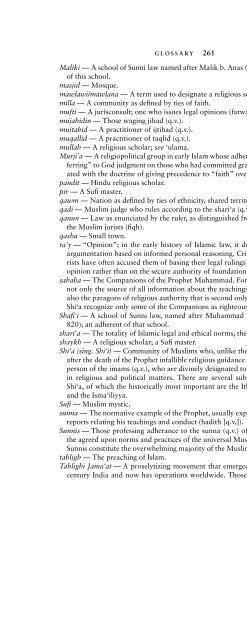Download (1 MB) - Islam and Christian-Muslim Relations: Articles ...
Download (1 MB) - Islam and Christian-Muslim Relations: Articles ...
Download (1 MB) - Islam and Christian-Muslim Relations: Articles ...
You also want an ePaper? Increase the reach of your titles
YUMPU automatically turns print PDFs into web optimized ePapers that Google loves.
GLOSSARY 261Maliki — A school of Sunni lawnamed after Malik b. Anas (d. 795); an adherentof this school.masjid — Mosque.mawlawi/mawlana — A term used to designate a religious scholar; see ‘ulama.milla — A community as defined by ties of faith.mufti — A jurisconsult; one who issues legal opinions (fatwas [q.v.]).mujahidin — Those waging jihad (q.v.).mujtahid — A practitioner of ijtihad (q.v.).muqallid — A practitioner of taqlid (q.v.).mullah — A religious scholar; see ‘ulama.Murji’a — A religiopolitical group in early <strong>Islam</strong> whose adherents insisted on “deferring”to God judgment on those who had committed grave sins; often associatedwith the doctrine of giving precedence to “faith” over “works.”p<strong>and</strong>it — Hindu religious scholar.pir — A Sufi master.qawm — Nation as defined by ties of ethnicity, shared territory, <strong>and</strong> language.qadi — <strong>Muslim</strong> judge who rules according to the shari‘a (q.v.).qanun — Lawas enunciated by the ruler, as distinguished from the discourses ofthe <strong>Muslim</strong> jurists (fiqh).qasba — Small town.ra’y — “Opinion”; in the early history of <strong>Islam</strong>ic law, it designated a mode ofargumentation based on informed personal reasoning. Critics of the Hanafi juristshave often accused them of basing their legal rulings on “mere” personalopinion rather than on the secure authority of foundational religious texts.sahaba — The Companions of the Prophet Muhammad. For the Sunnis, they arenot only the source of all information about the teachings of Muhammad butalso the paragons of religious authority that is second only to the Prophet. TheShi‘a recognize only some of the Companions as righteous.Shafi‘i — A school of Sunni law, named after Muhammad b. Idris al-Shafi‘i (d.820); an adherent of that school.shari‘a — The totality of <strong>Islam</strong>ic legal <strong>and</strong> ethical norms; the sacred lawof <strong>Islam</strong>.shaykh — A religious scholar; a Sufi master.Shi‘a (sing. Shi‘i) — Community of <strong>Muslim</strong>s who, unlike the Sunnis, believe thatafter the death of the Prophet infallible religious guidance must continue in theperson of the imams (q.v.), who are divinely designated to lead the communityin religious <strong>and</strong> political matters. There are several subdivisions within theShi‘a, of which the historically most important are the Ithna ‘ashariyya (q.v.)<strong>and</strong> the Isma‘iliyya.Sufi — <strong>Muslim</strong> mystic.sunna — The normative example of the Prophet, usually expressed in the form ofreports relating his teachings <strong>and</strong> conduct (hadith [q.v.]).Sunnis — Those professing adherance to the sunna (q.v.) of the Prophet <strong>and</strong> tothe agreed upon norms <strong>and</strong> practices of the universal <strong>Muslim</strong> community. TheSunnis constitute the overwhelming majority of the <strong>Muslim</strong> people worldwide.tabligh — The preaching of <strong>Islam</strong>.Tablighi Jama‘at — A proselytizing movement that emerged in early-twentiethcenturyIndia <strong>and</strong> now has operations worldwide. Those associated with the



